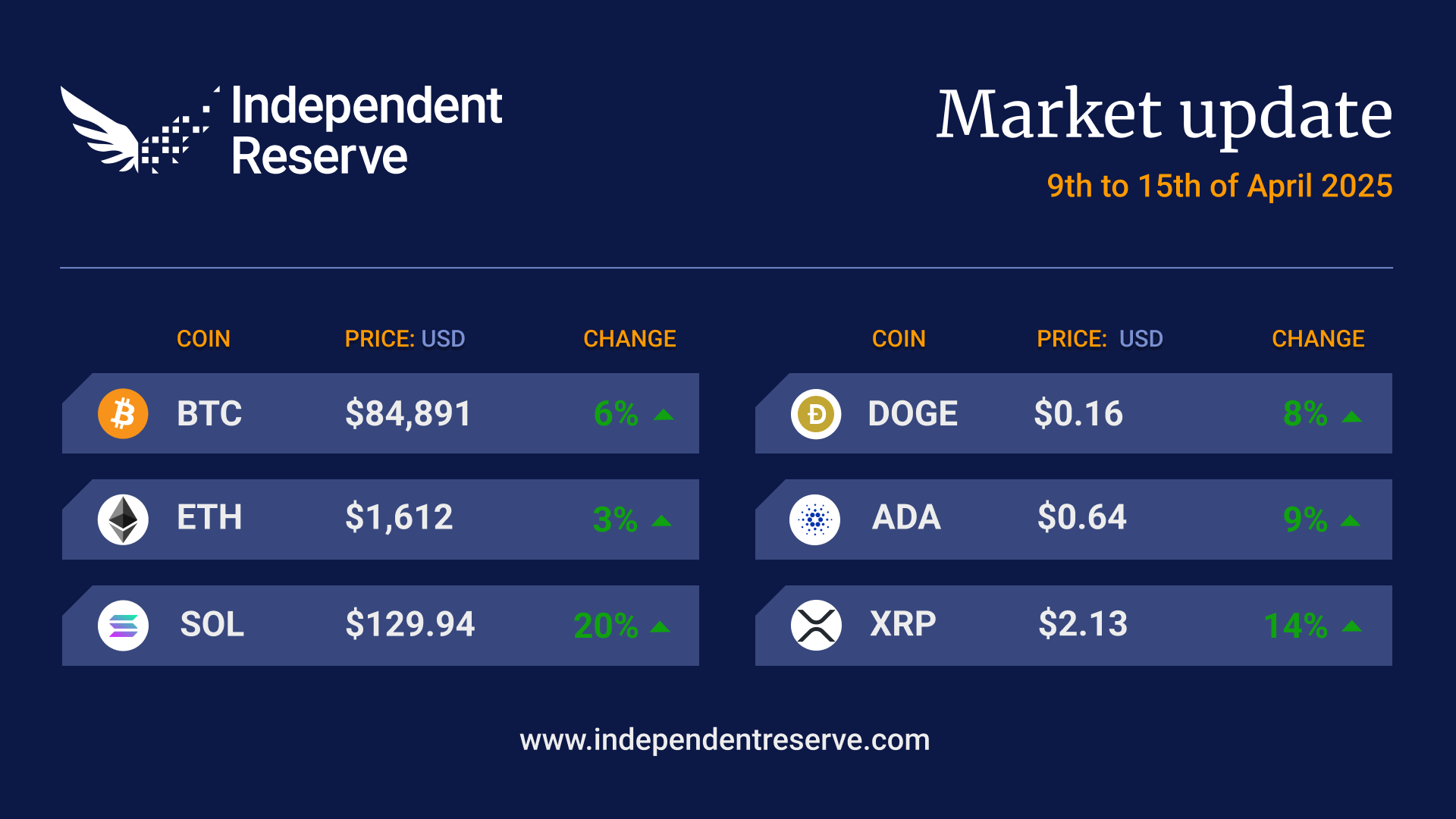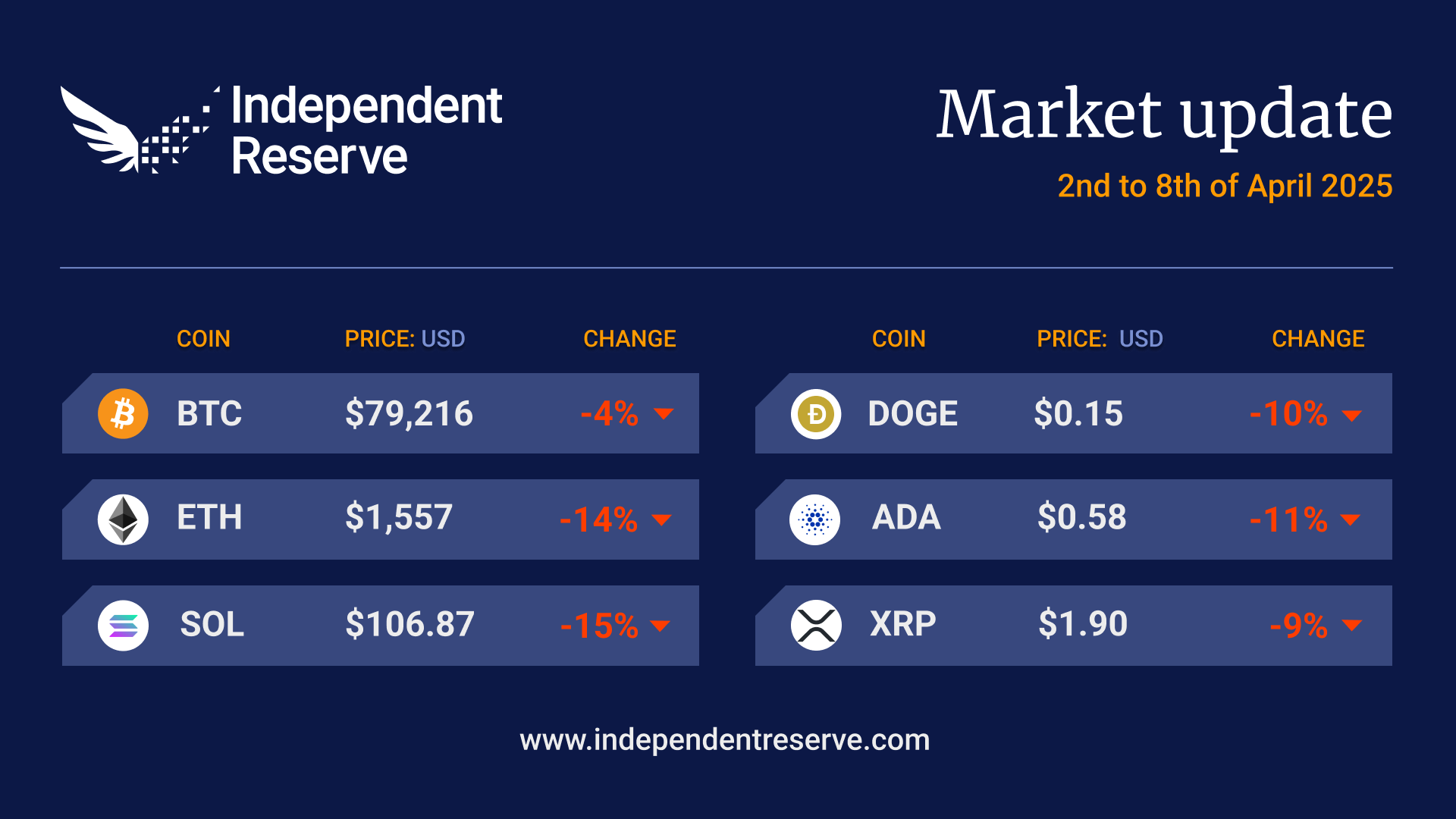In Markets
Congratulations team, we have notched up a new all-time high, with Bitcoin hitting AU$89,160 (US$66,234) on October 21. The market cap of all cryptocurrencies is currently at AU$3.491 trillion (US$2.62T). Ethereum made a push but faltered about $10 short of previous USD all time highs, hitting US$4,330) on October 21. Due to AUD/USD fx rate changes, the AUD price of ETH did hit a new all time high of $5,838. As Crypto Twitter likes to say WAGMI. Bitcoin is currently trading just around AU$84,300 and is down 2% for the week. Ethereum is trading at AU$5,650 and is up 9% for the week. Cardano and XRP were fairly flat this week, Polkadot gained 4%, Dogecoin (3%), and Chainlink (21%). The Crypto Fear and Greed Index is at 72, or Extreme Greed.
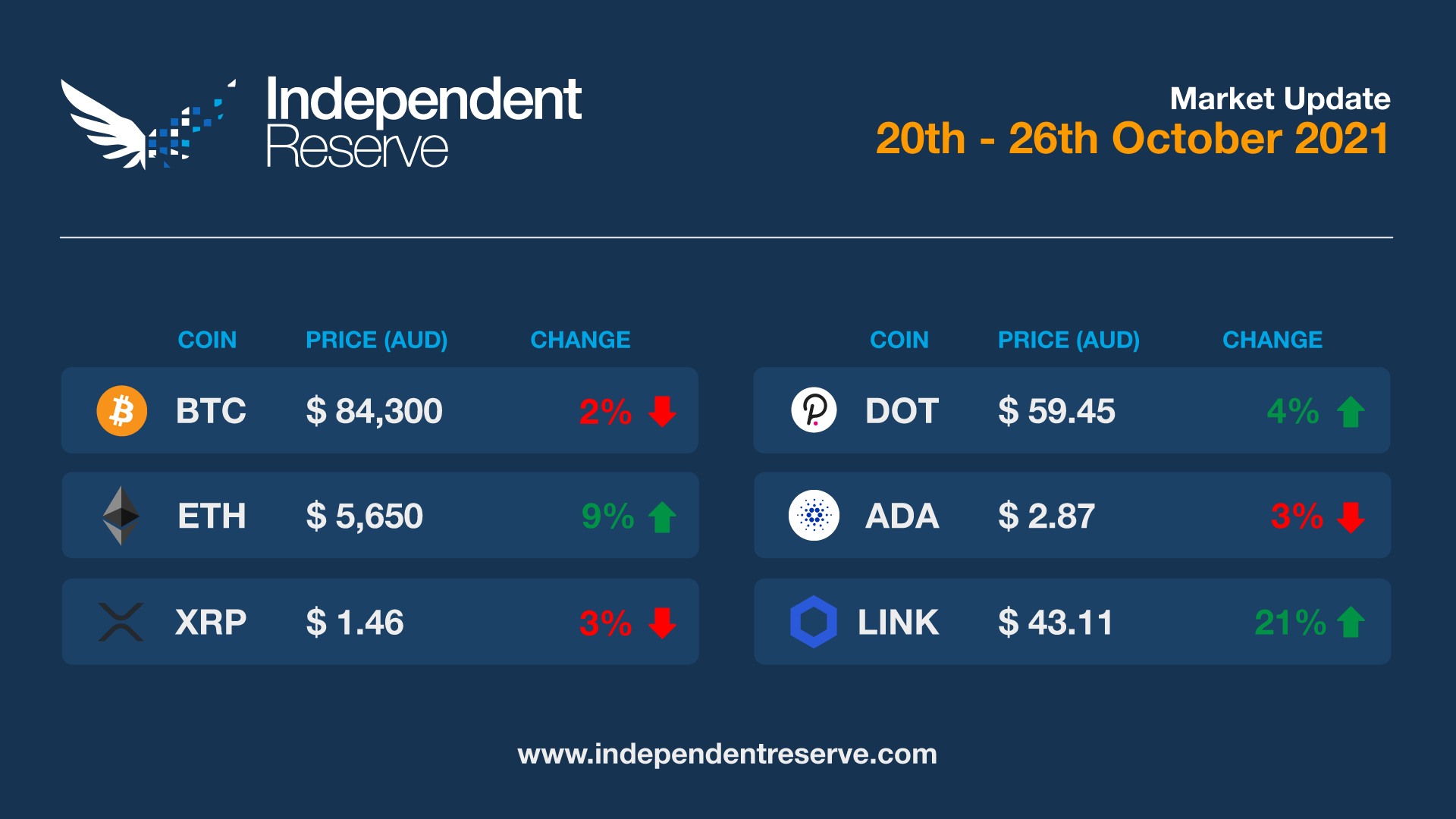
From the IR OTC Desk
Headlining the domestic data this week is Australian Q3 CPI, which is due to be released on Wednesday 27th October. While it remains unclear whether this data will prove significant, given that the majority of Australia was in lockdown during this observation period, high energy prices and built-up demand in global supply chains have continued to drive large moves in bond and currency markets. AUD/USD has recently traded above 0.7500 – the first time since July, and interest rate futures markets in Australia are pricing in a 25bp cash rate increase by Q3 2022. This week’s data will prove critical to whether current interest rate and FX market pricing is sustained.
In the US, the “persistent” versus “transitory” inflation debate continues. The US 10yr break even inflation rate (derived from the bond market), rose to its highest level since September 2012, while the 5yr break even inflation rate rose to the highest level since March 2005! Expect this topic of discussion to remain ongoing.
On the OTC desk, this week delivered new BTC all-time highs (21 October), corresponding to customer profit taking in BTC and ETH – as to be expected when the market tests such significant levels. Having mentioned last week that the BTC futures term structure had steepened to near 6 monthly wides, ETF AUM appears to have taken a breather from its frenetic start, and BTC implied volatility has now softened from last week’s extended levels. We are not seeing a material pickup in ALT interest directly, although there have been indications from the wholesale market that general interest has been increasing.
For any trading needs, please don’t hesitate to get in touch.
In Headlines
Uptober and away
IntoTheBlock’s head of research Lucas Outumuro notes that: “Historically after breaking an ATH following a correction of 30+ days, $BTC proceeds to increase by 145% on average.” If history is a guide, then expect AU$126K (US$94K) incoming. Meanwhile analyst PlanB’s floor price predictions have been panning out so far, and he’s tipping AU$131K in November and AU$180K in December “so that will be a really nice Christmas this year if that comes true.” If all this week’s good news wasn’t enough, Tesla’s latest quarterly report has raised the possibility of it accepting Bitcoin payments again.
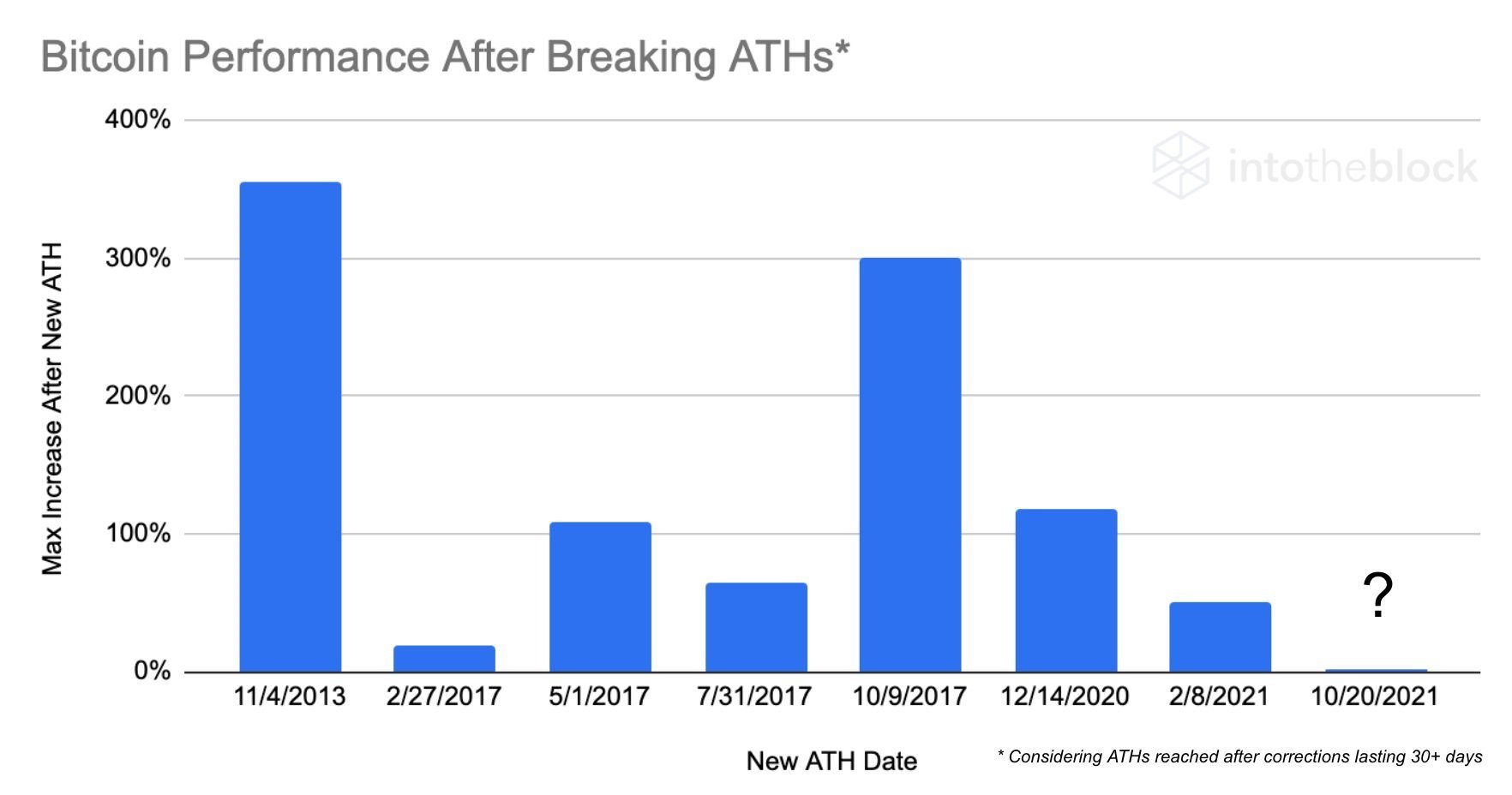
Bitcoin ETF a massive success
The catalyst for the latest surge in prices was the launch of the ProShares Bitcoin Strategy ETF (BITO). It did around US$1B (AU$1.3B) in volume on its first day, which was the second highest in history. It also amassed US$1B (AU$1.3B) assets under management by day two, breaking an 18 year old record held by a gold ETF which hit the same mark in three days. It’s becoming too successful in fact, and looks as if it may hit the upper limit for the number of futures contracts allowed. On Friday the Valkyrie Bitcoin Strategy ETF launched (the cheeky BTFD was changed back to BTF after the SEC disapproved) and the Van Eck Bitcoin Futures ETF is due to start trading this week.
But are ETFs really the catalyst?
Analysts at global investment bank JPMorgan say that inflation concerns are the real catalyst behind Bitcoin’s push to the upside. With the launch of the first future’s based Bitcoin ETF last week, the asset class saw a pick up in interest although, the firms’ analysts say it’s not the basis for such price action, in a recent research paper. “By itself, the launch of BITO is unlikely to trigger a new phase of significantly more fresh capital entering bitcoin”. The observations noted were that “the perception of bitcoin as a better inflation hedge than gold was the main reason for the current upswing”. This has led to a shift from gold ETFs into Bitcoin funds since September time, the paper states. With this, the analysts also support a “bullish outlook for bitcoin into year-end.”
Grayscale outperforms
Grayscale’s Bitcoin Trust has actually performed better that BITO since it was launched: by around 8.78 percentage points in the past week. Grayscale CEO Michael Sonnenshein says Monday’s volume of US$374M (AU$499M) was higher than BITO’s US$286M (AU$382M). However Bloomberg ETF analyst Eric Balchunas points out that GBTC’s performance has lagged that of ordinary Bitcoin hodlers (like IR customers) by 130% over the past 12 months.
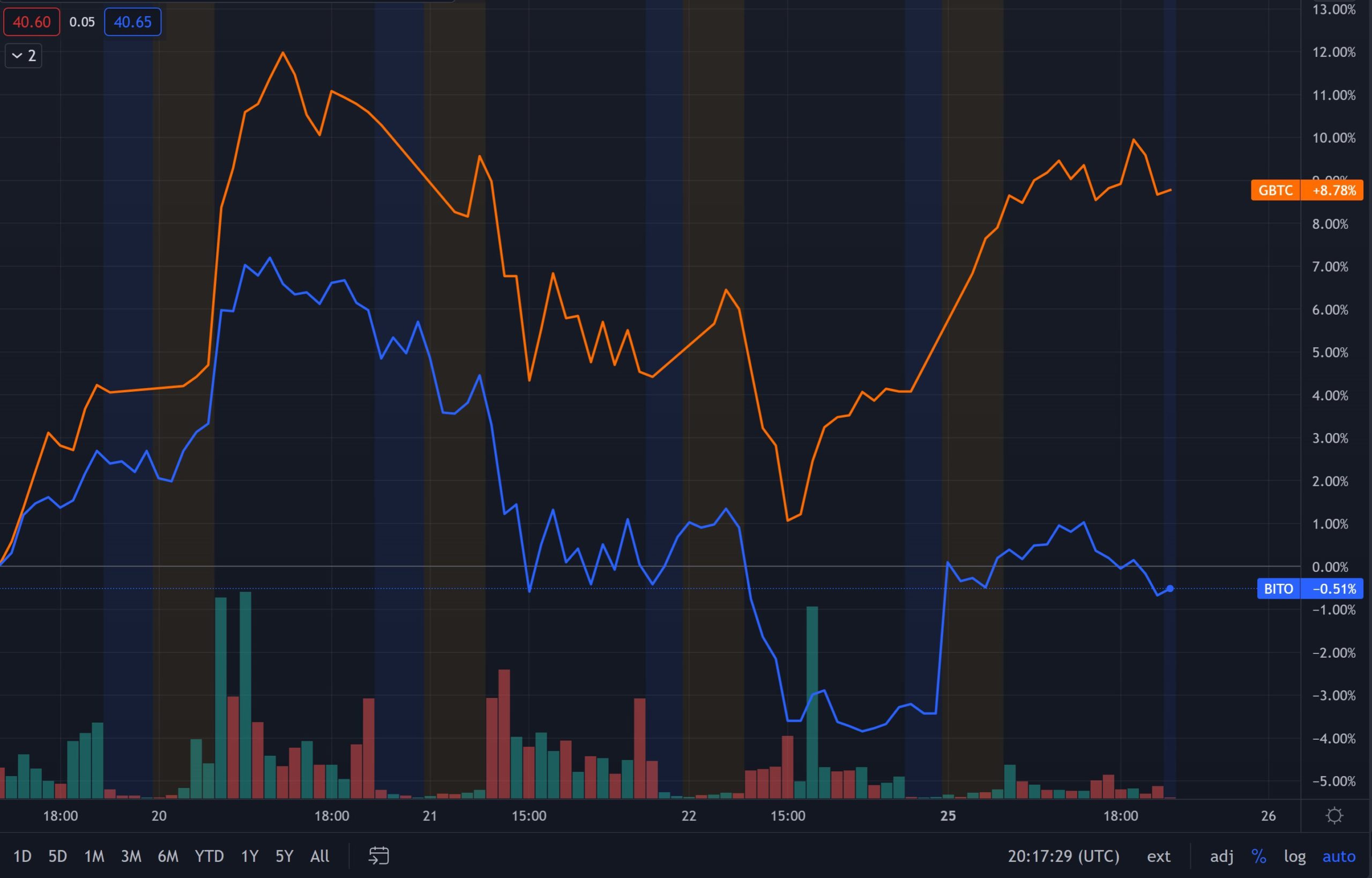
Grayscale outperforms BITO
Mastercard and Bakkt
Today’s big story is that thousands of US banks and financial institutions and millions of merchants in Mastercard’s payments network will be able to integrate crypto into their products. That includes buying and selling, crypto wallets and credit cards. Partner Bakkt will provide custody services and Bakkt’s shares tripled on the news. “We want to offer all of our partners the ability to more easily add crypto services to whatever it is they’re doing,” said Sherri Haymond, Mastercard’s executive vice president of digital partnerships.
Australia to become a crypto hub
The local crypto community has welcomed the 12 recommendations in the third and final report issued by the Senate Committee on Australia as a Technology and Financial Centre. It proposes new licences for crypto exchanges, world leading new laws to govern decentralised autonomous organisations (DAOs), an overhaul of capital gains tax, especially in decentralised finance (DeFi) and a 10% tax discount for crypto miners using renewable energy. If the recommendations make it into law, Australia may well become a world crypto hub.
Facebook’s Novi wallet
A pilot for Facebook’s Novi crypto wallet was launched this week in partnership with Coinbase to allow users to send money between the US and Guatemala. But a group of five Senators including Elizabeth Warren immediately condemned it and told founder Mark Zuckerberg in no uncertain terms to “immediately discontinue it”. “Facebook cannot be trusted to manage a payment system or digital currency when its existing ability to manage risks and keep consumers safe has proven wholly insufficient,” they wrote in an open letter. Meanwhile it turns out that one reason that Facebook whistleblower Frances Haugen was prepared to dish the dirt is that she’s financialy independent thanks to crypto. She’s currently hanging out with “crypto friends” in Puerto Rico.
Bits and pieces
The mysterious DeFi founder served by the SEC at Messari’s Mainnet conference in September was Do Kown, the CEO of Terraform Labs which is behind synthetic stock platform Mirror Protocol. He’s now suing the SEC. Twitter and Square CEO Jack Dorsey has issued a warning about the dangers of inflation saying: “Hyperinflation is going to change everything… It’s happening.” The US is seriously examining a tax on unrealised capital gains, although fortunately it would only apply to billionaires at this stage. Crypto billionaire SBF was not impressed. Meanwhile another billionaire, Paul Tudor Jones, said he believes crypto is “winning the race against gold at the moment” as a hedge against inflation. American Express CEO Stephen Squeri takes a similar view, telling Yahoo Finance, “You know, I sort of view it as gold.” Meanwhile Senator Rand Paul told Axios he believes crypto could eventually replace the US dollar as “the reserve currency of the world.”
SEC to take lead in regulating stable coins
After a snap meeting called on by U.S. Treasury Secretary Janet Yellen, developments around a regulation plan for stable coins were conducted alongside financial regulators, according to a recent Bloomberg report. Accordingly, the Treasury Department concluded that the SEC along with the Commodity Futures Trading Commission will take the lead in regulating the US$130 billion dollar asset class. All of this is set to be outlined in a Treasury report released sometime this week. In addition, the Bloomberg report also claims that the SEC may also be granted the power to set policies for stable coins and enforce them. SEC Chair Gensler is on record for stating that centralised stable coins are similar to money market funds and should be regulated as such.
Until next week, happy trading!

